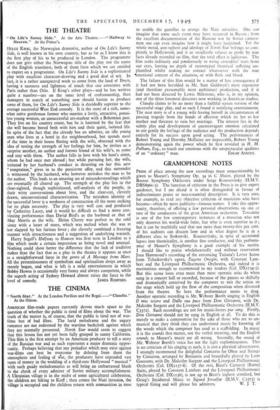THE THEATRE
HELGE KROG, the Norwegian dramatist, author of On Life's Sunny Side, is well known in his own country, but as tar as I know this is the first play of his to be produced in London. The programme does not give either the Norwegian title of the play nor the name of the English translator, both of them facts which we are entitled to expect on a programme. On Life's Sunny Side is a sophisticated play with excellent character-drawing and a good deal of wit. In fact, it is a rather unexpected work to come from the land of Ibsen, having a sureness and lightness of touch that one associates with Paris rather than Oslo. If Krog's other plays—and he has written quite a number—are on the same level of craftsmanship, then managers in search of something new should hasten to produce some of them, for On Life's Sunny Side is decidedly superior to the average successful West End comedy. It is the story of a rich, some- what naïve gentleman farmer who marries a lively, attractive, penni- less young woman, an unsuccessful art-student with a Bohemian past. They live on his country estate, but he is haunted by the fear that she will become bored both with him and their quiet, isolated life. In spite of the fact that she already has an admirer, an idle young man who lives at a hotel in the neighbourhood, but spends most of the time in their house flirting with the wife, obsessed with the idea of testing the strength of her feelings for him, he invites as a surprise another, an author and former friend of his wife's, to come and stay with them. The author falls in love with his host's sister, whom he had once met abroad ; but while pursuing her, the wife, irritated by her husband's conduct in thrusting on her this new "temptation," gives in to the persistent idler, and this surrender is witnessed by the husband, who however mistakes the man to be the author. This leads to an amusing set of misunderstandings which are eventually all cleared up. The strength of the play lies in the clear-sighted, though sophisticated, self-analysis of the people, in their witty conversations about love, and the clear-cut, cleverly drawn, unconventional characterisation. The mistaken identity of the successful lover is a weakness of construction all the more striking for its plain necessity. The play is very well cast and produced by Catherine Lacey, and it would 132 difficult to find a more con- vincing performance than David Bird's as the husband or that of May Morris as the wife. Helen Cherry was perfect as the cold sister with a heart of stone, which was melted when she was at last slapped by her furious lover ; she cleverly combined a freezing manner with attractiveness and a suggestion of underlying warmth.
Harry Segall's Halfway to Heaven was first seen in London as a film which made a certain impression as being novel and unusual. Nothing could show better the difference that the lack of tradition makes than th& fact that as a play in the theatre it appears at once as a straightforward farce in the genre of A Message from Mars. All the pretentiousness of symbolism and spiritualism drops away as merely bogus, and what is left is a mild entertainment in which Bobby Howes is occasionally very funny and always competent, while the superb acting of Sydney Howard almost raises the farce to the


























 Previous page
Previous page